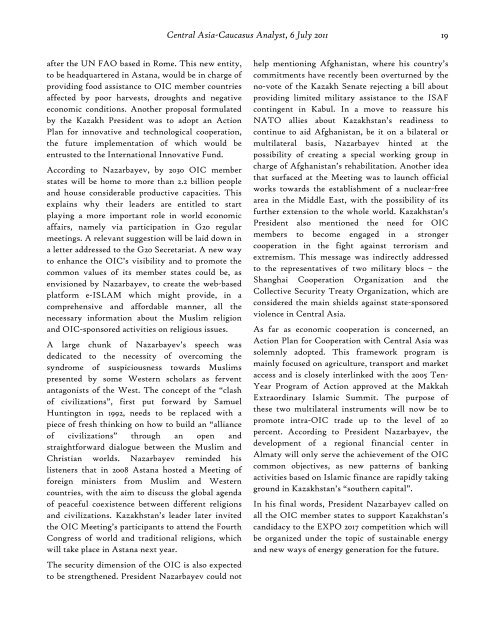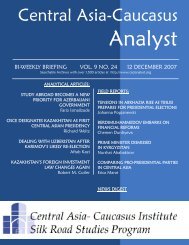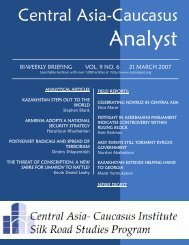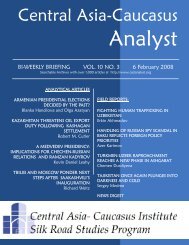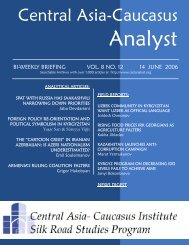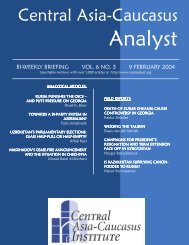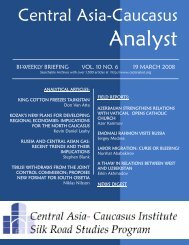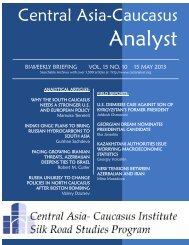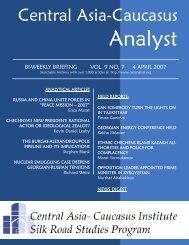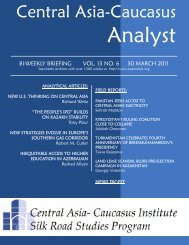No. 13, July 7 issue - Central Asia-Caucasus Institute and Silk Road ...
No. 13, July 7 issue - Central Asia-Caucasus Institute and Silk Road ...
No. 13, July 7 issue - Central Asia-Caucasus Institute and Silk Road ...
Create successful ePaper yourself
Turn your PDF publications into a flip-book with our unique Google optimized e-Paper software.
<strong>Central</strong> <strong>Asia</strong>-<strong>Caucasus</strong> Analyst, 6 <strong>July</strong> 2011 19<br />
after the UN FAO based in Rome. This new entity,<br />
to be headquartered in Astana, would be in charge of<br />
providing food assistance to OIC member countries<br />
affected by poor harvests, droughts <strong>and</strong> negative<br />
economic conditions. Another proposal formulated<br />
by the Kazakh President was to adopt an Action<br />
Plan for innovative <strong>and</strong> technological cooperation,<br />
the future implementation of which would be<br />
entrusted to the International Innovative Fund.<br />
According to Nazarbayev, by 2030 OIC member<br />
states will be home to more than 2.2 billion people<br />
<strong>and</strong> house considerable productive capacities. This<br />
explains why their leaders are entitled to start<br />
playing a more important role in world economic<br />
affairs, namely via participation in G20 regular<br />
meetings. A relevant suggestion will be laid down in<br />
a letter addressed to the G20 Secretariat. A new way<br />
to enhance the OIC’s visibility <strong>and</strong> to promote the<br />
common values of its member states could be, as<br />
envisioned by Nazarbayev, to create the web-based<br />
platform e-ISLAM which might provide, in a<br />
comprehensive <strong>and</strong> affordable manner, all the<br />
necessary information about the Muslim religion<br />
<strong>and</strong> OIC-sponsored activities on religious <strong>issue</strong>s.<br />
A large chunk of Nazarbayev’s speech was<br />
dedicated to the necessity of overcoming the<br />
syndrome of suspiciousness towards Muslims<br />
presented by some Western scholars as fervent<br />
antagonists of the West. The concept of the “clash<br />
of civilizations”, first put forward by Samuel<br />
Huntington in 1992, needs to be replaced with a<br />
piece of fresh thinking on how to build an “alliance<br />
of civilizations” through an open <strong>and</strong><br />
straightforward dialogue between the Muslim <strong>and</strong><br />
Christian worlds. Nazarbayev reminded his<br />
listeners that in 2008 Astana hosted a Meeting of<br />
foreign ministers from Muslim <strong>and</strong> Western<br />
countries, with the aim to discuss the global agenda<br />
of peaceful coexistence between different religions<br />
<strong>and</strong> civilizations. Kazakhstan’s leader later invited<br />
the OIC Meeting’s participants to attend the Fourth<br />
Congress of world <strong>and</strong> traditional religions, which<br />
will take place in Astana next year.<br />
The security dimension of the OIC is also expected<br />
to be strengthened. President Nazarbayev could not<br />
help mentioning Afghanistan, where his country’s<br />
commitments have recently been overturned by the<br />
no-vote of the Kazakh Senate rejecting a bill about<br />
providing limited military assistance to the ISAF<br />
contingent in Kabul. In a move to reassure his<br />
NATO allies about Kazakhstan’s readiness to<br />
continue to aid Afghanistan, be it on a bilateral or<br />
multilateral basis, Nazarbayev hinted at the<br />
possibility of creating a special working group in<br />
charge of Afghanistan’s rehabilitation. Another idea<br />
that surfaced at the Meeting was to launch official<br />
works towards the establishment of a nuclear-free<br />
area in the Middle East, with the possibility of its<br />
further extension to the whole world. Kazakhstan’s<br />
President also mentioned the need for OIC<br />
members to become engaged in a stronger<br />
cooperation in the fight against terrorism <strong>and</strong><br />
extremism. This message was indirectly addressed<br />
to the representatives of two military blocs – the<br />
Shanghai Cooperation Organization <strong>and</strong> the<br />
Collective Security Treaty Organization, which are<br />
considered the main shields against state-sponsored<br />
violence in <strong>Central</strong> <strong>Asia</strong>.<br />
As far as economic cooperation is concerned, an<br />
Action Plan for Cooperation with <strong>Central</strong> <strong>Asia</strong> was<br />
solemnly adopted. This framework program is<br />
mainly focused on agriculture, transport <strong>and</strong> market<br />
access <strong>and</strong> is closely interlinked with the 2005 Ten-<br />
Year Program of Action approved at the Makkah<br />
Extraordinary Islamic Summit. The purpose of<br />
these two multilateral instruments will now be to<br />
promote intra-OIC trade up to the level of 20<br />
percent. According to President Nazarbayev, the<br />
development of a regional financial center in<br />
Almaty will only serve the achievement of the OIC<br />
common objectives, as new patterns of banking<br />
activities based on Islamic finance are rapidly taking<br />
ground in Kazakhstan’s “southern capital”.<br />
In his final words, President Nazarbayev called on<br />
all the OIC member states to support Kazakhstan’s<br />
c<strong>and</strong>idacy to the EXPO 2017 competition which will<br />
be organized under the topic of sustainable energy<br />
<strong>and</strong> new ways of energy generation for the future.


